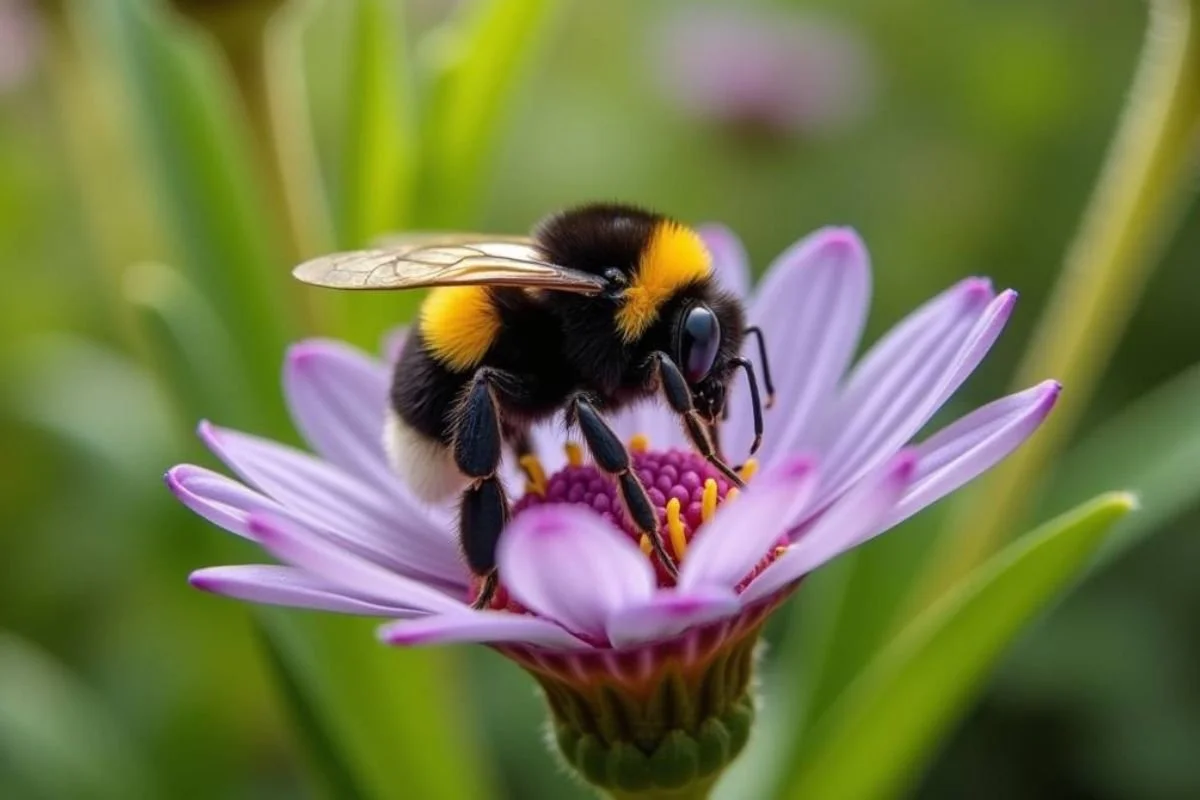The Most Important Species of Bees Around the World.
Bees are far more than just honey producers — they are crucial pollinators that keep ecosystems thriving and global food production stable. With over 20,000 known species of bees, each plays a unique role in pollinating crops, flowers, and wild plants. Understanding the most important species of bees helps us appreciate their contribution to our planet and why we must protect them.
In this article, we’ll explore the most important species of bees around the world, their unique traits, and how they help sustain life as we know it.
1. The Western Honeybee (Apis mellifera)
When most people think of bees, they picture the Western honeybee. This species is the most widely recognized and commercially managed bee in the world.
Honeybee collecting nectar on flower.
Key Traits:
Known for making honey and beeswax
Live in highly organized colonies with a queen, workers, and drones
It can be found on every continent except Antarctica
Importance:
Honeybees are responsible for pollinating more than 75% of the crops we consume, including almonds, apples, blueberries, and cucumbers. Their ability to be domesticated makes them the backbone of commercial agriculture. Without honeybees, the cost of many foods would skyrocket, and crop yields would drop dramatically.
2. The Bumblebee (Genus Bombus)
Bumblebees are the large, fuzzy pollinators that many gardeners love to see buzzing around flowers. There are more than 250 species of bumblebees worldwide.
Key Traits:
Bumblebee pollinating purple flower.
Covered with soft hair that traps pollen
Can fly in cooler temperatures and lower light than honeybees
Perform "buzz pollination," shaking pollen loose with rapid wing movement
Importance:
Bumblebees are particularly important for crops like tomatoes, peppers, and berries. Their ability to fly in colder weather allows them to pollinate early-spring flowers, making them essential for ecosystems in northern climates.
3. The Stingless Bee (Tribe Meliponini)
Stingless bees are a fascinating group of tropical bees found in Central and South America, Africa, Asia, and Australia.
Key Traits:
Do not sting, making them safe for people
Live in colonies and produce a tangy, medicinal honey called meliponine honey
Build unique nests inside tree cavities or underground
Importance:
These bees are vital pollinators for tropical crops like coffee, mango, and cacao (used to make chocolate). Indigenous communities have kept stingless bees for centuries, using their honey for food and medicine.
4. The Blue Orchard Mason Bee (Osmia lignaria)
Mason bees are solitary pollinators that do not live in hives like honeybees. Instead, they nest in small holes, hollow stems, or wooden tunnels.
Key Traits:
Metallic blue or green color
Extremely efficient pollinators — one mason bee can do the work of 100 honeybees
Gentle and non-aggressive
Importance:
Mason bees are excellent for backyard gardens and orchards. They are especially important for pollinating fruit trees such as cherries, apples, and pears. Many gardeners even set up “bee hotels” to attract and protect these beneficial insects.
5. The Giant Honeybee (Apis dorsata)
Native to Southeast Asia, the giant honeybee is one of the largest honeybees in the world.
Key Traits:
Build large, exposed honeycombs that hang from tree branches or cliffs
Known for aggressive colony defense
Produce large amounts of honey, but are harder to manage than Apis mellifera
Importance:
The giant honeybee plays a key role in pollinating tropical forests, helping to maintain biodiversity. They are also valued for honey collection in rural communities, though harvesting can be dangerous due to their defensive behavior.
6. The Indian Honeybee (Apis cerana)
Apis cerana is the Asian counterpart of the Western honeybee and is commonly kept by beekeepers across Asia.
Key Traits:
Slightly smaller than the Western honeybee
Naturally resistant to some pests and diseases
Adapted to tropical and subtropical climates
Importance:
Indian honeybees are crucial pollinators for tea, mustard, and many native plants in Asia. They are a more sustainable choice for small-scale farmers compared to imported species.
7. The Africanized Honeybee (Hybrid of Apis mellifera)
Commonly called the “killer bee,” this species is a hybrid between European honeybees and African honeybees.
Key Traits:
Extremely defensive when disturbed
Thrive in warm climates
Highly efficient pollinators despite their reputation
Importance:
Africanized honeybees are critical for pollinating crops in parts of South and Central America. While they require careful management, they are hardy and disease-resistant, making them valuable in tropical beekeeping.
8. The Alkali Bee (Nomia melanderi)
Alkali bees are lesser-known but incredibly effective pollinators.
Key Traits:
Solitary ground-nesting bees
Prefer alkaline soils, hence their name
Excellent pollinators for alfalfa, a key livestock crop
Importance:
Alkali bees are so good at pollinating alfalfa that some farmers actively protect their nesting grounds. This ensures higher seed yields and healthier forage for cattle and other livestock.
Why Protecting Bee Species Matters
Bees are keystone species, meaning their survival impacts entire ecosystems. The decline of bee populations due to habitat loss, pesticides, climate change, and disease threatens global food security. By protecting diverse bee species, we ensure stronger, more resilient ecosystems and stable agricultural production.
How You Can Help Save Bees
Even small actions can make a big difference in supporting global bee populations:
Plant Bee-Friendly Flowers: Choose native wildflowers, herbs, and flowering shrubs that provide nectar and pollen.
Avoid Pesticides: Opt for organic or natural pest control methods.
Support Local Beekeepers: Buy raw, local honey and beeswax products.
Provide Nesting Sites: Install bee hotels for solitary bees or leave some bare ground for ground-nesting species.
Educate Others: Share information about the importance of bees with friends and family.
Final Thoughts
The most important bee species around the world do much more than make honey — they make life possible. From the hardworking honeybee to the solitary mason bee, each species contributes to pollination, food security, and biodiversity.
By understanding and protecting these pollinators, we can help create a healthier planet for future generations. Whether you are a gardener, farmer, or simply someone who enjoys fresh fruits and vegetables, supporting bees means supporting life itself.
Important Species of Bees Around the World.



